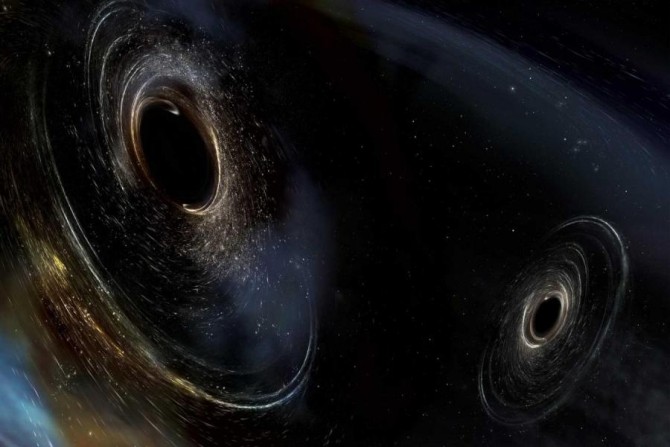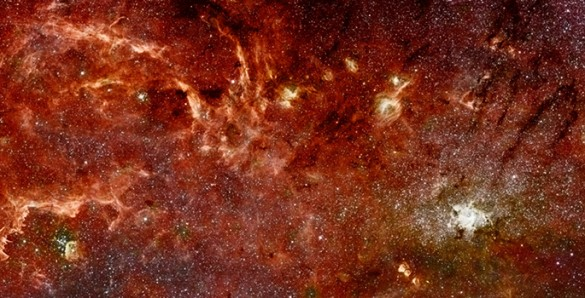搜索结果: 1-15 共查到“天文学 t-J model”相关记录143条 . 查询时间(0.125 秒)
Academy of Mathematics and Systems Science, CAS Colloquia & Seminars:Tracing the Evolution of SMBHs and Stellar Objects in Galaxy Mergers: A Multi-mass Direct N-body Model
星系合并 SMBH 恒星物体演化 多质量 直接N体模型
2023/11/13


Scientists develop the largest, most detailed model of the early universe to date(图)
早期宇宙模型 黎明女神 Thesan 辐射
2023/6/9
A numerical model of cohesion in planetary rings
Planetary rings Saturn, Rings Rotational dynamics Tides, Solid body Ices, Mechanical properties Collisional physics
2015/12/25
We present a numerical method that incorporates particle sticking in simulations using the N-body code pkdgrav to study motions in a local rotating frame, such as a patch of a planetary ring. Particle...
A steady-state model of NEA binaries formed by tidal disruption of gravitational aggregates
Asteroids dynamics Satellites of asteroids
2015/12/25
We present results of a simulation of a steady-state binary near-Earth asteroid (NEA) population. This study combines previous work on tidal disruption of gravitational aggregates [Walsh, K.J., Richar...
Binary near-Earth asteroid formation:Rubble pile model of tidal disruptions
Asteroids Dynamics Rotational dynamics Tides solid body
2015/12/25
We present numerical simulations of near-Earth asteroid (NEA) tidal disruption resulting in bound, mutually orbiting systems. Using a rubble pile model we have constrained the relative likelihoods for...
Giant stars die a violent death. After a life of several million years, they collapse into themselves and then explode in what is known as a supernova.How these stars explode remains a mystery. Howeve...

New model of cosmic stickiness favors “Big Rip” demise of universe(图)
cosmic stickiness favors Big Rip demise of universe
2015/7/13
The universe can be a very sticky place, but just how sticky is a matter of debate.That is because for decades cosmologists have had trouble reconciling the classic notion of viscosity based on the la...
The environments of supernova explosions are often inhomogeneous, and there may be jumps in their density structure. We have developed a semianalytic model under the thin-shell approximation for super...
X-ray absorption by the low-redshift intergalactic medium: A numerical study of the Lambda cold dark matter model
theory intergalactic medium
2014/12/24
Using a hydrodynamic simulation of a cold dark matter universe with a cosmological constant, we investigate the "X-ray forest" absorption imprinted on the spectra of background quasars by the interven...
XMM-Newton Spectra of Intermediate-Mass Black Hole Candidates: Application of a Monte Carlo Simulated Model
NGC 5408 NGC 628
2014/12/24
We present a systematic spectral analysis of six ultraluminous X-ray sources (NGC 1313 X-1 and X-2, IC 342 X-1, Ho IX X-1, NGC 5408 X-1, and NGC 3628 X-1) observed with the XMM-Newton observatory. The...
Confronting the Superbubble Model with X-Ray Observations of 30 Doradus C
bubbles HII regions
2014/12/24
We present an analysis of XMM-Newton observations of the superbubble 30 Dor C and compare the results with the predictions from the standard wind-blown bubble model. We find that the observed X-ray sp...
Non-equilibrium ionization model for stellar cluster winds and its application
NGC 3603 general
2014/12/23
We have developed a self-consistent physical model for superstellar cluster winds based on combining a 1D steady-state adiabatic wind solution and a non-equilibrium ionization calculation. Comparing w...
Accretion, feedback and galaxy bimodality: a comparison of the GalICS semi-analytic model and cosmological SPH simulations
cooling fl ows evolution
2014/12/23
We compare the galaxy population of a smoothed particle hydrodynamics (SPH) simulation to those predicted by the GalICS (Galaxies In Cosmological Simulations) N-body + semi-analytic model and a stripp...
A Bayesian approach to the semi-analytic model of galaxy formation: methodology
galaxy formation methodology
2014/12/22
We believe that a wide range of physical processes conspire to shape the observed galaxy population but we remain unsure of their detailed interactions. The semi-analytic model (SAM) of galaxy formati...


